|
|
|
Sort Order |
|
|
|
Items / Page
|
|
|
|
|
|
|
| Srl | Item |
| 1 |
ID:
106380
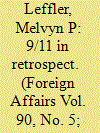

|
|
|
| 2 |
ID:
104786
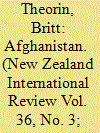

|
|
|
| 3 |
ID:
114126
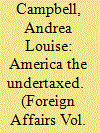

|
|
|
|
|
| Publication |
2012.
|
| Summary/Abstract |
Compared with other developed countries, the United States has very low taxes, little income redistribution, and an extraordinarily complex tax code. If it wanted to, the government could raise taxes without crippling growth or productivity. Tax reform is ultimately a political choice, not an economic one -- a statement about what sort of society Americans want.
|
|
|
|
|
|
|
|
|
|
|
|
|
|
|
|
| 4 |
ID:
101893
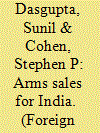

|
|
|
|
|
| Publication |
2011.
|
| Summary/Abstract |
With India planning to buy $100 billion worth of new weapons over the next ten years, arms sales may be the best way to revive Washington's relationship with New Delhi, its most important strategic partner in the region.
|
|
|
|
|
|
|
|
|
|
|
|
|
|
|
|
| 5 |
ID:
113135
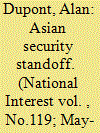

|
|
|
| 6 |
ID:
095973


|
|
|
| 7 |
ID:
123229
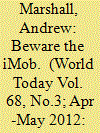

|
|
|
| 8 |
ID:
098220
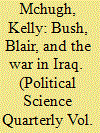

|
|
|
| 9 |
ID:
115276
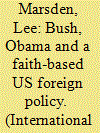

|
|
|
|
|
| Publication |
2012.
|
| Summary/Abstract |
In a calculated move to appeal to his core constituency during his first term, President George W. Bush launched domestic and international faith-based initiatives designed to leverage public finance for religious groupings to carry out social and welfare functions formerly performed by government or secular organizations. In December 2002 the Center for Faith-Based and Community Initiatives (CFBCI) was extended to the United States Agency for International Development (USAID). The Center's intention was to 'create a level playing field' for faith-based and community groups to compete for foreign assistance funding. These presidential initiatives are problematic, however, calling into question the first amendment-the separation of church and state. Upon taking office Barack Obama set up the Office of Faith-based and Neighborhood Partnerships, promising a greater emphasis on community/neighbourhood programs. The CFBCI remains a fixture in USAID and Obama shows as much enthusiasm for the initiative as his predecessor. Faith-based international relations and political science scholars have sought to build on these initiatives and call for a greater role for faith in US foreign policy. On the eve of the 2012 presidential election, this article considers the claims for a faith-based foreign policy by examining the construction of a faith-based discourse by academics and successive presidents. Using faith-based initiatives and USAID as a case-study, the article discusses criticisms of the policy and focuses on the role of a conservative evangelical organization, Samaritan's Purse, to illustrate the advantages and disadvantages of faith-based approaches. The article argues that advocates of faith-based foreign policy, in seeking special privileges for ecumenical religious actors, overlook their declining international significance and the opportunities afforded to less tolerant but more populist religious actors which have the potential seriously to harm US foreign policy objectives.
|
|
|
|
|
|
|
|
|
|
|
|
|
|
|
|
| 10 |
ID:
121221
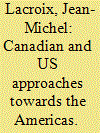

|
|
|
|
|
| Publication |
2012.
|
| Summary/Abstract |
The purpose of this article1
is to envisage the evolution of the relations
between Canada and the United States with their southern neighbours,
with the objective of comparing the respective attitudes of the two North
American partners vis-à-vis Latin America. Under the administration
of George W. Bush, anti-Americanism intensi?ed worldwide. Nothing
comparable occurred in the case of Canada: as a middle power with a legacy
of peacekeeping initiatives in its recent past, it naturally came to be perceived
in a more positive way. This difference led many to wonder whether Canada
might be contemplated, in the Americas as elsewhere, as representing
somehow a "more acceptable" version of the US. Or at least it did so until
the past few years, during which time it has been said that the elections of
Stephen Harper in 2006 and of Barack Obama in 2008 have brought about
a shift in the two countries' "images." This article seeks to test this claim,
with special reference to the relations of each with Latin America.
|
|
|
|
|
|
|
|
|
|
|
|
|
|
|
|
| 11 |
ID:
130279
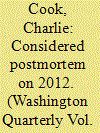

|
|
|
|
|
| Publication |
2013.
|
| Summary/Abstract |
The November 2012 election results revealed and underscored greater changes in American political dynamics than many of us had anticipated. Republicans, who had won the popular vote in four out of the five presidential elections from 1968-1988, have now lost five out of the last six, with 2000 notably featuring a Democratic popular vote win but George W. Bush capturing the Electoral College. Republicans last won 300 or more electoral votes in 1988; Democrats have now exceeded 300 in four of the last six elections, from 1992-2012. Keeping in mind that 270 electoral votes are needed to win, Democrats have now carried 18 states plus the District of Columbia in six consecutive elections, a combination totaling 242 electoral votes-89 percent of the 270 needed to win an election. One can now say that Democrats have a home field advantage in presidential races.
|
|
|
|
|
|
|
|
|
|
|
|
|
|
|
|
| 12 |
ID:
133660
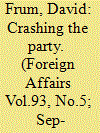

|
|
|
|
|
| Publication |
2014.
|
| Summary/Abstract |
Three big trends -- a growing reliance on older voters, an extremist ideological turn, and an increasing internal rigidity -- have changed the Republican Party over the past decade, weakening its ability to win presidential elections and inhibiting its ability to govern.
|
|
|
|
|
|
|
|
|
|
|
|
|
|
|
|
| 13 |
ID:
097063


|
|
|
| 14 |
ID:
111924
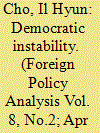

|
|
|
|
|
| Publication |
2012.
|
| Summary/Abstract |
During his tenure, President George W. Bush touted the East Asian democratic experience as a positive model for democratization in the Middle East. Contrary to the premise of democracy leading to regional stability, however, East Asian democracies in the past decade have often become a source of regional instability. Based on a comparative analysis of political developments in Taiwan, Japan, and South Korea, this paper explores the foreign policy behavior of East Asian democracies and assesses the overall impact on regional security dynamics. Specifically, I argue that incomplete democratic consolidation, combined with the political salience of national identity, sparked a process of acute intergroup competition among domestic political actors. As a result, the foreign policy orientation of the three East Asian democracies became belligerent, thereby unnecessarily increasing regional tensions.
|
|
|
|
|
|
|
|
|
|
|
|
|
|
|
|
| 15 |
ID:
085136
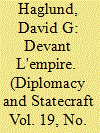

|
|
|
|
|
| Publication |
2008.
|
| Summary/Abstract |
Many observers of contemporary French politics would find it difficult to resist the temptation to conclude that France, alone among the European allies of the United States, has consistently had the greatest difficulty in adjusting to the reality of America's power. When that power occasions, as it frequently does, debates about "American empire," French opposition to American influence seems to become even more pronounced. In fact, there has in recent decades been a distinctive French negative assessment of the merits of American empire, but it would be a mistake, or so this paper argues, to assume that French interests have invariably been at odds either with American power or with American empire. Using four eponymous figures to illustrate the French perspective on American empire in the past 100 years, this essay highlights how and why that assessment has evolved.
|
|
|
|
|
|
|
|
|
|
|
|
|
|
|
|
| 16 |
ID:
110295
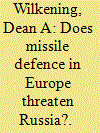

|
|
|
|
|
| Publication |
2012.
|
| Summary/Abstract |
For decades, Russian leaders have expressed concern over American ballistic-missile defence programmes. Early US and Soviet attempts in the 1960s were curtailed by the Anti-Ballistic Missile Treaty of 1972. US proponents of missile defence decried the treaty as an attempt by the Soviet Union to overcome what those proponents believed was America's lead in BMD technology. Russian embrace of the idea that defences upset strategic stability, the central paradigm of the treaty, was suspect because the Soviet Union spent inordinate sums developing strategic air and civil defences, reflecting its conviction that limiting damage from a hypothetical nuclear attack was a worthwhile, if not achievable, goal.
After US President Ronald Reagan's 1983 'Star Wars' speech, Moscow again expressed concern over the US Strategic Defense Initiative, even though such plans were technically fanciful at the time. Within the decade, Russian concerns had subsided, due in part to Russian scientists who noted the infeasibility of many of Reagan's space-based weapons and, more importantly, to more pressing issues raised by the collapse of the Soviet Union. Yet the Strategic Defense Initiative had at least one viable offspring in the form of hit-to-kill interceptors, which were successfully demonstrated in a 1984 test (the Homing Overlay Experiment).
|
|
|
|
|
|
|
|
|
|
|
|
|
|
|
|
| 17 |
ID:
126348
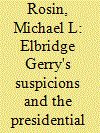

|
|
|
|
|
| Publication |
2013.
|
| Summary/Abstract |
Defenders of the Electoral College frequently assert that victory in the Electoral College requires a winning candidate to "produce a coalition of states with wide and diverse interests" thereby producing "a broadly based electoral victory." These defenders never stop to consider the fact that in a close election the difference between the winning and losing coalition of states may depend on highly contingent factors. In a 2003 article in this journal Neubauer and Zeitlin demonstrated that George W. Bush's Electoral College victory in 2000 depended on the size of the House of Representatives. In this article I demonstrate that the outcome of the 2012 election could have depended on the 2012 Electoral College being based on the newly apportioned incoming House rather than the previously apportioned outgoing House. This is a statutory specification rather than a constitutional requirement. It could be changed by simple legislation. We have Elbridge Gerry's suspicions to thank for this statutory contingency!
|
|
|
|
|
|
|
|
|
|
|
|
|
|
|
|
| 18 |
ID:
131664
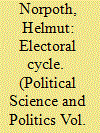

|
|
|
| 19 |
ID:
123571
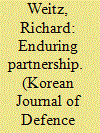

|
|
|
| 20 |
ID:
106521


|
|
|
|
|
|
|
|